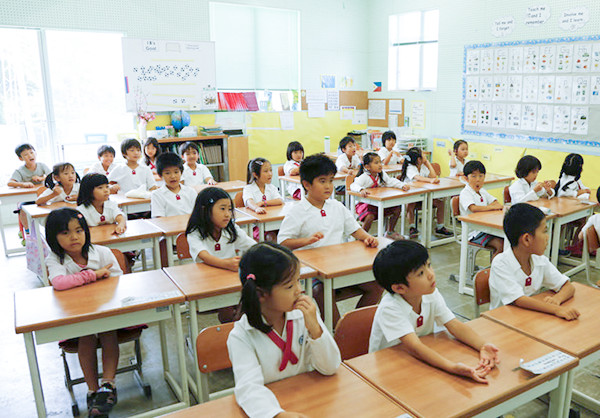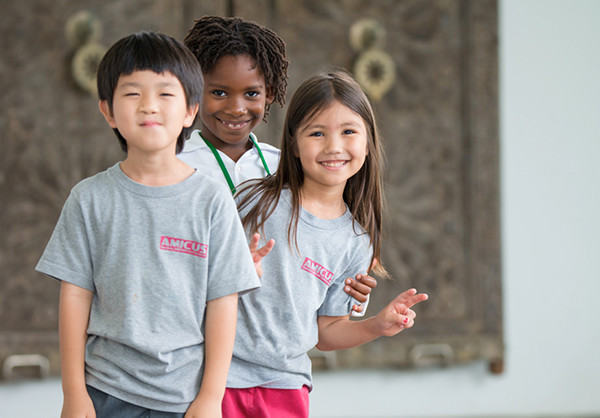Educational Philosophy
Developing global citizens who can think, learn and act independently
in a learning environment where students forge their own paths for the future.
Ability to think

To become independent, one must develop the ability to think for himself/herself. Every child is a unique, independent being, and each one of them will also have his/her unique set of issues to deal with in his/her life. Though some help may be available, each child still has to solve such issues on his/her own in the end. This is precisely the reason why one must have the ability to think independently. In other words, this ability to think for oneself is the foundation of an independent being, and it is the core of one’s life.
Learning

One needs to learn to become independent. Learning gives knowledge, and based on this knowledge, children develop their own worldview. With rich, accurate knowledge, a child’s worldview will likely be broader and more universal. AMICUS will guide children to a significant understanding of people and phenomena. Education at AMICUS aims to equip children with depth and breadth of knowledge, fostering the development of clever, healthy, self-sufficient children.
Communication

Cultivating such individuals require the ability to communicate effectively with others. Children need to have companions when developing their communication abilities in order to gain a sense of identity and a truer understanding of self. The AMICUS focus on educating children in English is rooted in the reality that English is a valuable tool for communicating with the people of the world. With a working knowledge of English, children will have the language resources to facilitate enriched contacts with the people and cultures of the world. In the process, children will gain a better understanding of themselves and their own country. Lively, flexible communication will help to develop a unique, creative persona. We anticipate that children will reap the benefits of expanding their communication through English and Japanese, through a greater sense of partnership with people, and with more appreciation and deeper respect for the people of this world. Such ability to communicate will become their strength to take actions.

In understanding and appreciating people’s differences, we strongly affirm a policy of non-discrimination, in terms of ethnicity, national origin, religion, gender, and disability. We value the strength in diversity among the people of the world. We understand that by underlining people’s differences, there can be difficulty in equitably assessing some of the world’s most challenging issues. Children need awareness, intellect, and sensitivity to understand and to act on the facts of a matter. Children of diverse backgrounds gathering together to learn at AMICUS in the same space is the embodiment of the essence of globalized education.
A school is a highly socialized entity that is profoundly influenced by society at large. At the same time, a school nourishes and enriches society. A society builds schools, and schools provide the building blocks for a society. AMICUS aims to serve our community and the world by contributing to society through educating children to value their lives as thinkers, lifelong learners, and doers.
Our Vision

Characteristics of AMICUS “Glocal Citizens”
AMICUS provides a rich learning environment that helps develop in our young people a glocal mind-set. It employs a holistic approach to nurture our learners to be creative thinkers (THINK), independent learners (LEARN) and risk takers (ACT).
# Creative Thinker
(THINK)
- Thinks globally and appreciates cultural diversity
- Takes multiple perspectives on a problem
- Communicates effectively and confidently in multi-cultural settings
# Independent Learner
(LEARN)
- Questions, reflects and perseveres
- Takes responsibility for lifelong learning
- Uses technology adeptly
# Risk Taker
(ACT)
- Exercises initiative, resilient and embraces change
- Is adaptable, innovative and collaborative
- Possesses socio-cultural sensitivity and awareness
Bringing out each student’s potential and letting it grow
We focus on the following in order to enhance individual characteristics and potential.
Improving academic ability and the desire to learn
Through discovering each child’s individuality, we will increase the desire to learn and with it academic achievement.
Understanding and acceptance of diversity
Through understanding individual differences we will create an open and accepting mindset and eliminate bullying and intolerance.
Nurturing the aspiration for a peaceful world
Using Okinawa’s distinctive features, we will find the meaning and importance of peace in our daily lives.
Cultivating international awareness
Through provision of an English-rich environment, and improvement in English ability we will provide a wealth of international learning opportunities and experiences.
Acquiring the skills to adapt to and apply technology
Through the positive use of ICT in educational activities, we will acquire the ability to use it correctly and effectively.
Cherishing Okinawa and the region
Through deepening understanding of Okinawa and the region we will build appreciation of its value.
Enhancing emotional sensibility
To seek to build a rich emotional life starting with education in music and art, leading to an enhanced life as a human being.
Improving problem-setting and solving skills
Providing opportunities for students to think for themselves, make discoveries and actively problem-solve, and in so doing cultivate the ability to carve their own paths in the future.
Fostering confidence in one’s abilities
To encourage children to believe「I think I can do that」, and provide ample opportunity to do so.
Acquiring the skills to live effectively in Japanese society
Through education in basic life-skills, health and welfare to acquire the basic skills and attitudes to adapt to society.
What is immersion education?
The term “immersion” has its origin in the word “to immerse,” such that this concept is generally understood to mean a “language bath” in which the children are immersed in a stimulating environment that is conductive to language acquisition. In a similar way, students are immersed in an English environment in the AMICUS’ Immersion Education. This is different from learning English in English classes. In AMICUS, students need to communicate in English from the start of the day in morning homeroom and learn the content of the most subjects via English, because English is used as the medium of communication and instruction for daily activities. The aim of immersion education at AMICUS is the development of two languages, the native language and the second/foreign language, as well as the appropriate knowledge of the course content and intercultural competence. Both the English and Japanese languages and cultures are valued equally in the school. Various cultures including Japanese culture will be introduced to the students by our international staff.
AMICUS wants students to develop an international perspective where they see cultural similarities before they see differences, while enjoying the intercultural communication and exchange. We believe the teaching of language cannot be separated from the reaching of culture if we aspire to nurture our students to be Glocal Citizens.


